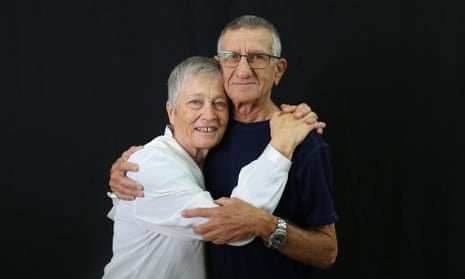I grew up in the south of Israel with my parents and four siblings in a small village called Netiv Haasara, which is one of the closest Israeli villages to the Gaza Strip. What I remember most vividly about my childhood is the scenery – beautiful sand dunes overlooking the Mediterranean. As a teenager, I would run for an hour to the beach, and my father would come and pick me up afterwards in his truck.
Every summer, including the last, my family and I travelled from London to spend time with my parents in the village. They enjoyed entire happy days with my three small children, getting to know our little 10-month-old boy, the youngest of their 11 grandchildren. We were so happy together – playing card games, swimming in the sea, doing artwork, working in the garden. It is hard to think of this place as a war zone, as the tragedy of the Hamas attack unfolds daily. Both my parents – my beloved wonderful parents, Yakov and Bilha Inon – are now dead.
I first started hearing news about the Hamas attacks when WhatsApp groups with my family and friends from the area started buzzing. My siblings and I received a short message from my parents saying that they could hear gunshots. They said they were safe inside the house and had locked the doors. This was the last time we heard from them. At the time, we weren’t scared because, as unimaginable as it is, the sound of gunshots and rockets could often be heard in their home, coming from the other side of the border. It wasn’t clear how close it was this time.
Later, when we tried to contact them, messages were no longer going through. Anxiously, we tried to get information through various means, and a few hours later managed to get in contact with a neighbour who had been hiding with her children in a closet during the attack. She could see from her window that my parents’ house was completely burned down.
That was when we realised that our worst fear had happened and that it was unlikely they had survived. We have not been given formal notice of their deaths because of the chaos and uncertainty everywhere. But unlike in nearby villages, Hamas wasn’t able to kidnap people from Netiv Haasara, so we were left to connect the dots.
Only later, during the Jewish week of mourning, Shiva, neighbours, who have suffered incomprehensible tragedies of their own, shared details of what had happened. It seems that my parents’ home was hit by a powerful shoulder rocket and they were killed on the spot. The pain is unbearable. My parents were a stable rock in my and my family’s life, and the only consolation I have is that they died together. Inseparable in life and death.
I had exceptional parents; they lived fulfilling and happy lives and touched many people. My father, Yakov, was a professional agronomist and even though he was 78 and somewhat retired, people begged him to work with them – and so he kept going. He loved his job and the fields of the land.
My mum, Bilha, was a nursery teacher before going on to specialise in training other nursery teachers in the use of art with young children. She had a gift for cultivating other people’s creativity. When she retired, she built a studio alongside our family home and filled the house with her artwork. We were supposed to celebrate her 76th birthday at the end of October.
Despite living abroad in recent years, my soul is connected to the people and the landscape I grew up in. I hoped that my children would love the place as I do. Swimming in the sea, picking oranges with my mother from the many orchards, running around in the wheat and corn fields my father helped to grow, picking wild mushrooms and looking for big snails in the winter – I have so many fond memories.
After heavy rains, we used to go and watch the flash floods. The best spot was the old railway bridge that was once part of the train tracks that connected Gaza with other cities under Ottoman and British rule. We would throw a branch into the water and watch as it disappeared under the bridge, see it again on the other side and follow it in the stream until it was gone.
Now, it feels as if a flash flood of blood engulfs the landscape and my grief is one small branch caught in the current. Everyone I know from my childhood has a horror story to tell. During the attack, I received cries for help from friends, who were holding the doors of their safe rooms for dear life while terrorists were trying to open them. We are all scared, hurt and distraught.
From this unbearable feeling of pain and distress, I wish to speak about what I believe is my parents’ legacy. People from both sides of the border have good reasons to hate one another. This is being used by those who feed on hate. But this cannot be the only option. My family does not seek revenge. My parents treated people based on their actions, not their affiliation with any group. We are being comforted by people from all walks of life, regardless of their religion, ethnicity, or gender. Close friends among the Bedouin community have also lost loved ones in the attack.
Our shared future is based on the belief that all human beings are equal, and deserving of respect and safety. This is how I was raised and how I am raising my own children. In the long term, and even if it’s very far away, the only real future is that of hope and peace. Please, stop the war.
Magen Inon is a London-based father of three from Israel who is a teacher and holds a PhD in philosophy of education
As told to Kirsty Major
Do you have an opinion on the issues raised in this article? If you would like to submit a response of up to 300 words by email to be considered for publication in our letters section, please click here.

